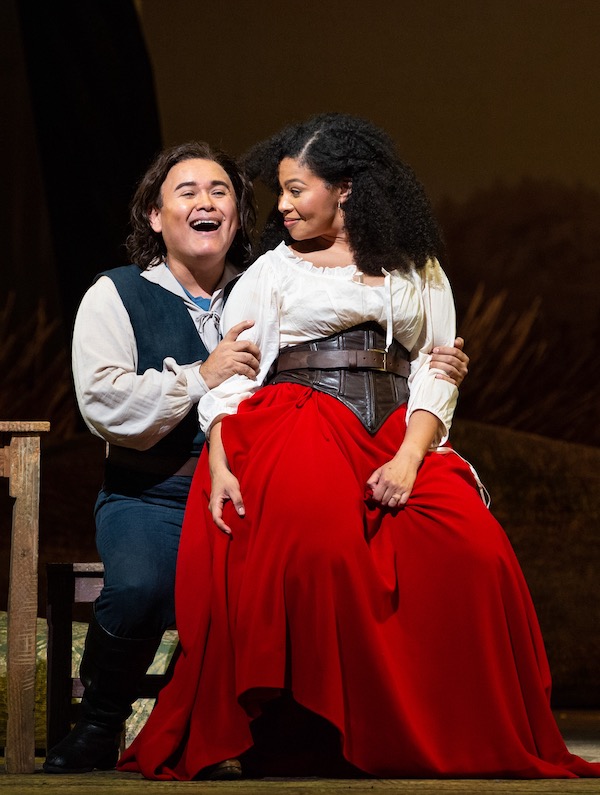A fine cast stirs up a charming brew in Met’s “Elixir of Love”

A comedy finally arrived to lighten the steady diet of death and despair this season at the Metropolitan Opera. Bartlett Sher’s charming production of Donizetti’s L’elisir d’amore returned Tuesday evening with a cast of Met favorites. The show is pure fancy, which couldn’t be more welcome this January.
The strongest emotions in Elixir of Love result from bumbled romantic overtures and bruised egos. Nemorino, a simple peasant, is in love with Adina, a beautiful rich landowner who feigns indifference. With the arrival of the soldiers in the village, a rival appears in the form of the dashing Sergeant Belcore. A love potion, courtesy of Dr. Dulcamara, a traveling medicine man, while little more than bad wine, works its magic. Adina and Nemorino are united, Belcore is chasing another skirt, and Dulcamara is amazed at the potency of his elixir.
Sher’s productionis a hear warmer for those who like a traditional setting, as well as a touch of broad comedy. He achieves intimacy by creating a stage within a stage. The blocking can be a bit crowded at times, but scene changes are quick and fluent.
The action is set in 1836, the year in which the movement for the unification of Italy began to gather momentum. Muted colors dominate in both Michael Yeager’s painted sets and Catherine Zuber’s costumes. The soldiers’ helmets are particularly impressive, as black and shiny as the wagon from which Dulcamara dispenses his love potion.
Javier Camarena was an aptly hapless Nemorino, true of heart, but a bit slow on the uptake. Nemorino is not as high-flying a bel canto role as others that Camarena sings regularly but it rests perfectly in his voice.“Quanto è bella” was all the more moving for the rich warm sound with which Camarena sang of his love for Adina. “Una furtiva lagrima” had all of the warmth and emotion that he could muster and predictably stopped the show.
In her role debut as Adina, Golda Schultz was as lovely as she was haughty when taunting Nemorino. While the other women of the village wore elegant pastel dresses, this Adina favored a peasant look and sported a black top hat. Schultz’s silvery, light soprano sparkled throughout the opera, but her finest singing was in “Prendi, per me sei libero”, in which she asks Nemorino to forgive her for tormenting him so. The depth of emotion she expressed and the scintillating richness of her voice were truly special.
Baritone Davide Luciano returned as Belcore, in which he made his Met debut in 2018. His Belcore is as dashing as he is vain. Machismo is part of this Belcore’s romantic arsenal; he unabashedly nestles his face in Adina’s bosom within seconds of meeting her. Luciano is lithe and agile physically, and much the same can be said about his voice. There’s a vibrancy in both that make for a fine Belcore.
Ambrogio Maestri was a larger than life Dulcamara in every sense of the phrase. His Dulcamara easily trumped Luciano’s Belcore when it came to ego and was equally opportunistic. He just happens to trade in potions rather than romance. The list of ailments that his elixir could cure tripped off his tongue. He polished off a bowl of spaghetti with equal relish.
A rising star at La Scala in his hometown of Milan, Michele Gamba made his Met debut with this performance. Under his baton, the Met Orchestra played with lightness and fizz. Gamba was especially attuned to balance, which was crucial given the lighter voices which he had to work with in such a large theater.
If bel canto and comedy are your cup of tea, try to catch one of the five remaining performances of L’elisir d’amore with this engaging cast. There’s much to savor visually and musically.
L’elisir d’amore runs through January 27 and returns with a new cast in April. metopera.com







